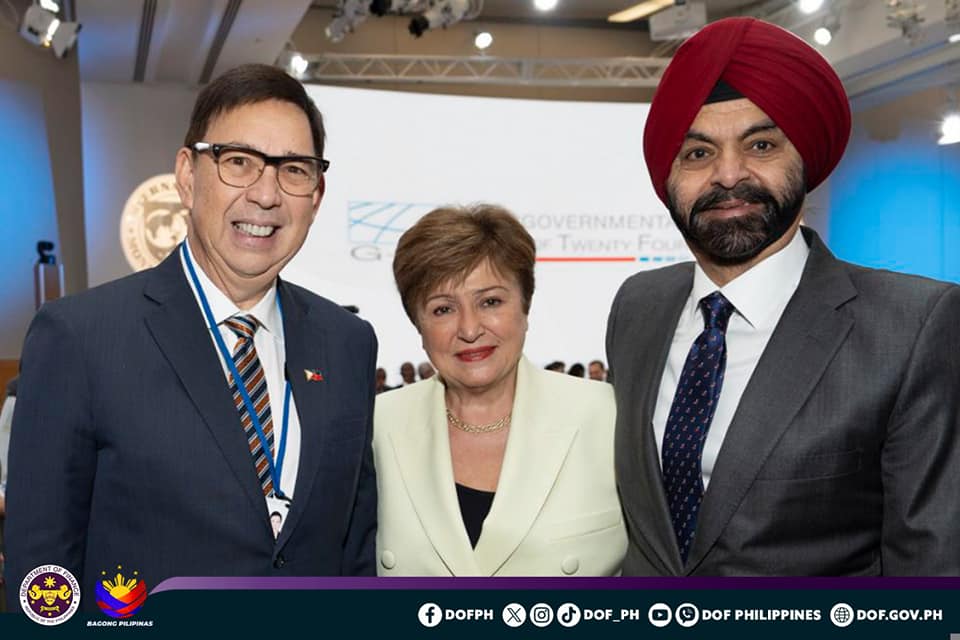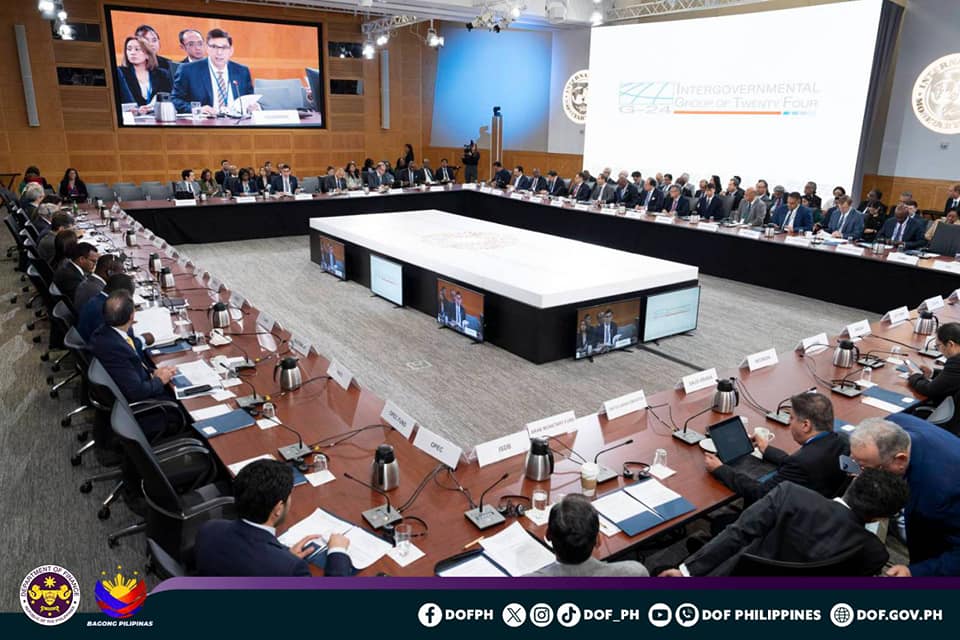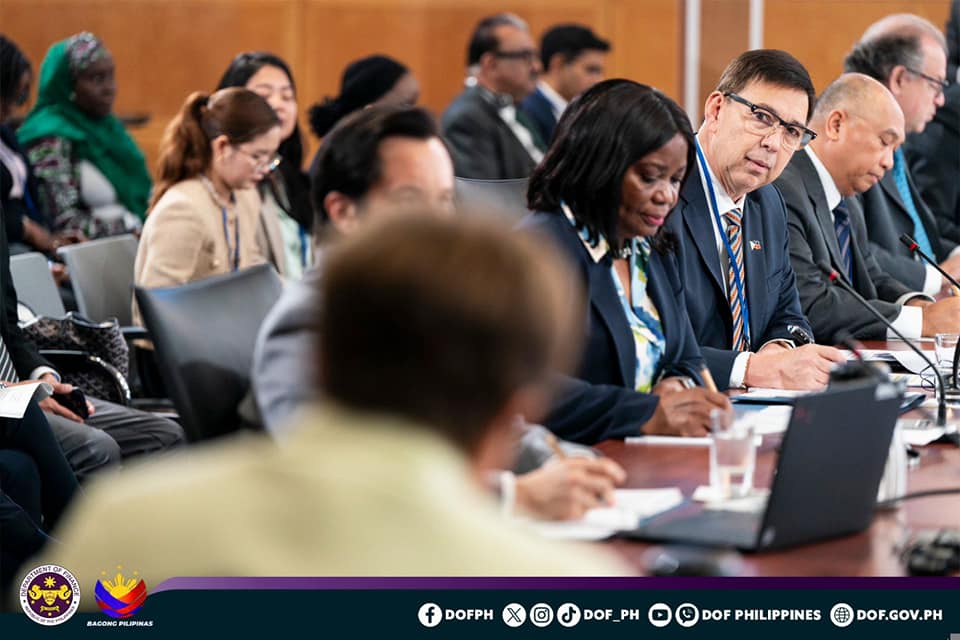Finance Secretary Ralph G. Recto successfully presided over the Intergovernmental Group of Twenty-Four (G-24) on April 16, 2024 as Chair of the Board of Governors where he called upon the international financial institutions to act decisively and ramp up support, emphasizing that this is a defining moment that will shape the fate of developing nations.
“The peace and prosperity of future generations rest in our hands. We cannot afford any delay or inaction,” Secretary Recto said in his opening remarks.
Formed in 1971, the G-24 helps coordinate the positions of developing countries on international monetary and development finance issues to ensure that their interests are adequately represented in negotiations on international monetary matters.
The Philippines currently serves as the Chair of the G-24 Bureau for 2023-2024.
With the theme, “Building Resilience to Meet Global Challenges”, the Ministerial Meeting provided an opportunity for ministers and the international finance institutions to exchange insights on world developments and for the latter to discuss critical reforms to support developing economies in facing global headwinds.
In particular, Secretary Recto stressed the urgency for the World Bank Group (WBG) and the International Monetary Fund (IMF) to intensify their efforts in assisting developing countries to mitigate and reverse the factors threatening their growth prospects, which entails immediate access to short-term liquidity and affordable long-term financing solutions.
“Alarmingly, one in every four developing countries is now poorer than before the pandemic. Any slowdown in global economic performance will surely hit the developing economies the hardest. This poses a grave threat to the peace, economic security, and prosperity of all our people,” he said.
Secretary Recto specifically underscored the need for innovative and responsive financing solutions that will help developing countries navigate the turbulent waters ahead.
“The ambitious replenishment, expedited disbursement, and efficient delivery of the International Development Association, or IDA21, is an urgent matter as it serves as a critical lifeline for developing nations,” Secretary Recto said.
IDA is part of the WBG that provides grants and low-interest loans for the world’s low-income countries.
The Finance Chief warned that without improvements to financing conditions in the short term, decades of individual and global efforts to eradicate poverty and inequality, combat climate change, and invest in growth-enhancing infrastructure projects will be put to a halt, if not reversed.
“We are counting on this meeting to set unprecedented multilateral cooperation. Together, let us find transformative solutions that will reclaim our gains and steer the global economy faster and further on the road to inclusive and irreversible growth,” Secretary Recto stressed.
In response, IMF Managing Director Kristalina Georgieva and WBG President Ajay Banga both shared the institutions’ respective programs aimed at providing wider access to concessional financing and supporting developing countries in sustaining productivity, enhancing long-term growth prospects, and increasing resilience to economic shocks.
In the G24 Bureau’s April 2024 Communiqué, the members emphasized the urgent need for equitable support from international financial institutions.
The Group lauded the IMF’s efforts to enhance access limits for the Poverty Reduction and Growth Trust (PRGT) facilities, recognizing their potential to bolster assistance to low-income countries during these challenging times.
However, given the substantial challenges confronting nations worldwide, the Group underscored the importance of ensuring the long-term sustainability of PRGT finances.
It also urged swift action to redirect Special Drawing Rights (SDR) from members with strong Balance of Payments positions towards strengthening resources for Emerging Markets and Developing Economies (EMDEs) as well as Multilateral Development Banks (MDBs).
Furthermore, the Group advocated for a downward revision of the margin on the IMF rate of charge given the organization’s solid financial performance at a time when EMDEs face limited fiscal space and a high debt service burden.
“This will reduce member’s burden and create the fiscal space necessary to implement programs and policies that enhance the achievement of development and climate goals,” the G24 Bureau said.
Highlighting the critical importance of a resilient Global Financial Safety Net centered around a well-endowed IMF, the Group welcomed the recent proportional increase in quotas as a positive step towards a quota-based IMF.
Nonetheless, it reiterated the importance of addressing the prevailing underrepresentation of EMDEs in the IMF’s governance framework, cautioning that failure to do so would perpetuate challenges to the organization’s legitimacy.
Meanwhile, the Group commended the WBG for working towards delivering a bigger, better, and more efficient bank that will improve the speed and efficiency of its services to its clients.
In line with this, it also welcomed efforts to increase the financial capacity of both the IDA and the International Bank for Reconstruction and Development (IBRD), and called for the substantial replenishment of the IDA21.
Moreover, the G24 Bureau recommended further reforms to the Common Framework (CF) to ensure that sovereign debt is resolved in a predictable, timely, orderly, and coordinated manner.
On climate change, the Group welcomed the initiative from developing countries to operationalize the Loss and Damage Fund (LDF), and called on donors to fulfill their commitments.
Moreover, the Group welcomed the progress at the United Nations towards establishing a Framework Convention on International Tax Cooperation and reiterated its call for solutions that are simple and lucrative for EMDEs.
Finally, the G24 called for increased cooperation to mitigate the risks associated with trade fragmentation and emphasized the enhancing collaboration between multilateral organizations and the World Trade Organization (WTO) to advance broader global objectives.
More details about the Communiqué can be accessed through this link: https://www.imf.org/en/News/Articles/2024/04/16/cm041624-intergovernmental-group-of-twenty-four-on-international-monetary-affairs-and-development
Though originally named after the number of the founding member-states, the G-24 now has 29 members, namely: Algeria, Argentina, Brazil, China, Colombia, Congo, Côte d’Ivoire, Ecuador, Egypt, Ethiopia, Gabon, Ghana, Guatemala, Haiti, India, Iran, Kenya, Lebanon, Mexico, Morocco, Nigeria, Pakistan, Peru, Philippines, South Africa, Sri Lanka, Syria, Trinidad and Tobago, and Venezuela.






